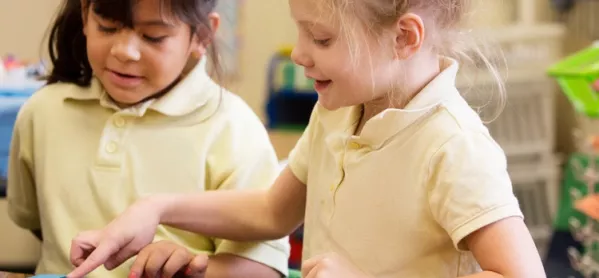- Home
- How to improve paired talk in primary maths
How to improve paired talk in primary maths

Before the introduction of the National Numeracy Strategy in 1997, it was unusual to see paired discussion in primary maths lessons. Pre-1996, maths was seen as a subject that children tackled independently and in silence.
However, over the past 20 years, “talk partners” have become much more common in maths, and lessons are now often punctuated by the teacher setting problems and then using phrases such as “Turn to the person next to you” or “Find your talk partner”, encouraging children to engage in mathematical discussion.
This has been a big step forward, but for many of us the model has not progressed. It is now time to reflect on this approach and to try to improve the model.
In my role as a primary mathematics educator within teacher training, I have observed hundreds of primary maths lessons. In many of these, I have seen teachers engage children in paired talk to varying degrees, but it is only in recent years that I have become much more focused on the quality and equality of these discussions.
In my experience, it is not uncommon to find pupils going off task, unsure of what they should be discussing, or to see one child dominating the discussions and the other sitting on the sidelines. The teacher, meanwhile, may be unaware whether the contributions are equal and the learning is shared.
I experienced the latter of these myself as a participant a couple of years ago. At a mathematics conference, I was paired with an A-level maths teacher and at one point we were given a maths problem to solve together. Before I had had an opportunity to read and internalise the problem, or begin to think about how I might solve it, my partner had completed it. Feeling disconnected, I wondered if this is often how children feel when they have no thinking space before working with another person in this way.
‘Prepare, Share, Compare’
With this in mind, a few months ago I introduced a new structured talk model to primary mathematics specialist students and teachers. Each person will have at least one or two minutes of quiet individual time to read the problem, internalise it and consider their approach - they prepare.
Then, on a recognised signal, children turn to each other and take turns to share their thinking and compare their methods, and then work together to reach the most efficient solution. I call this the “Prepare, Share, Compare” approach.
Early indications are promising. Some of my student teachers who have been using this approach report that children appreciate time to think, reason more and demonstrate greater understanding.
A large group of teachers is currently trialling the approach in maths lessons. They have also found that it works well for both same-ability and mixed-ability pairings, giving both children time to bring more clarity to their own thinking.
I now hope to research beyond the anecdotal, and ascertain whether children benefit from this approach and whether or not they prefer it. Perhaps it is time for the “talk partners” model to evolve a little further. It is a relatively small tweak that could make a big difference.
Jenny Field is a principal lecturer in primary mathematics education at the University of Greenwich. She is a National Teaching Fellow and an NCETM-accredited professional development lead provider
Register with Tes and you can read two free articles every month plus you'll have access to our range of award-winning newsletters.
Keep reading with our special offer!
You’ve reached your limit of free articles this month.
- Unlimited access to all Tes magazine content
- Save your favourite articles and gift them to your colleagues
- Exclusive subscriber-only stories
- Over 200,000 archived articles
- Unlimited access to all Tes magazine content
- Save your favourite articles and gift them to your colleagues
- Exclusive subscriber-only stories
- Over 200,000 archived articles